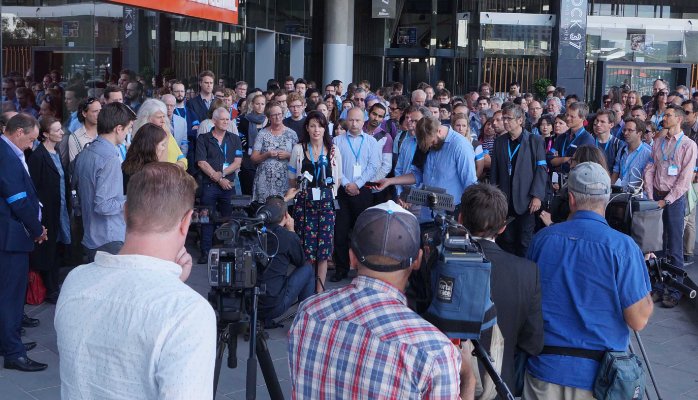
Over the past few days at the Australian Meteorological and Oceanographic Society's annual conference I have found myself pulled deeply into concerns of climate scientists in regards to savage cuts to climate science jobs at Australia's premier scientific body the Commonwealth Scientific and Industrial Research Organisation (CSIRO).
I have arranged a media conference and many many interviews for Australian scientists responding to the announcement by CSIRO Chief Executive Officer Larry Marshall that most of the organisation's researchers working in climate modelling would lose their jobs. Of the 140 researchers working specifically in this area, 110 would go.
The threat to Australia's role in national and international climate research is significant. Without additional funding from the government or the creation of a separate climate modelling body, these cuts spell the end of the development of Australia's world class Australian Community Climate and Earth System Simulator (ACCESS) model. The Australian Bureau of Meteorology and universities do not have the capacity to maintain ACCESS in their current form.
The decision to cut these jobs follows an audit of the climate component of CSIRO in December 2015 when the auditors examined the possibility of whether this sector could be profitable and bring in funds.
The decision to cut these jobs follows an audit of the climate component of CSIRO in December 2015 when the auditors examined the possibility of whether this sector could be profitable and bring in funds.
“We were having a hard time in demonstrating the capacity to be commercially valuable,” one CSIRO scientist said.
“Not that climate science can’t demonstrate incredible economic value to society by helping to adapt and reduce damages and risks, but that’s not the kind of economics that the new CEO and the government is going after.”...
...On Feb. 3, Marshall wrote in a memo that CSIRO would henceforth focus on commercially viable projects.
In terms of climate science this is an appalling situation for Australia but it also has far greater ramifications for science in this country and any other country that chooses to align its science to profit.
If Australian science is now driven by commercial viability, then this means any science effort that does not deliver a short term profit is likely to be wiped out.
The commercial relationship of big pharmacy companies with medical research has shown serious conflicts of interest. There are good arguments to be made that a number of drug developments, driven to the market by profit, have not been for the public good.
When publicly funded science is focused on building the value of private coffers then it is likely societal benefits will take second place.
Applied and pure science are about long-term investigation. Many of our great inventions and breakthroughs have come off the back of research that has taken decades and which would never have been pursued by the private sector or a government body driven by commercial viability.
Today Australia's climate modellers are under attack because they don't make a profit even though the public benefit of their work is clear. It may be climate scientists today but which branch of science will it be tomorrow?
All scientists need to raise their voices to protest the commercial imperative behind science that has become apparent at CSIRO.
To paraphrase a well known quote. "First they came for the climate scientists but I did not speak out because I was not a climate scientist".
Will there be anyone left to speak for your non-commercially viable branch of science when the cuts come for you?
If profit, ideology and discomfort with the findings of a science can be used as a reason to wipe out an entire branch of research, then every part of science is under threat.
It's time for all scientists to speak up.
In terms of climate science this is an appalling situation for Australia but it also has far greater ramifications for science in this country and any other country that chooses to align its science to profit.
If Australian science is now driven by commercial viability, then this means any science effort that does not deliver a short term profit is likely to be wiped out.
The commercial relationship of big pharmacy companies with medical research has shown serious conflicts of interest. There are good arguments to be made that a number of drug developments, driven to the market by profit, have not been for the public good.
When publicly funded science is focused on building the value of private coffers then it is likely societal benefits will take second place.
Applied and pure science are about long-term investigation. Many of our great inventions and breakthroughs have come off the back of research that has taken decades and which would never have been pursued by the private sector or a government body driven by commercial viability.
Today Australia's climate modellers are under attack because they don't make a profit even though the public benefit of their work is clear. It may be climate scientists today but which branch of science will it be tomorrow?
All scientists need to raise their voices to protest the commercial imperative behind science that has become apparent at CSIRO.
To paraphrase a well known quote. "First they came for the climate scientists but I did not speak out because I was not a climate scientist".
Will there be anyone left to speak for your non-commercially viable branch of science when the cuts come for you?
If profit, ideology and discomfort with the findings of a science can be used as a reason to wipe out an entire branch of research, then every part of science is under threat.
It's time for all scientists to speak up.